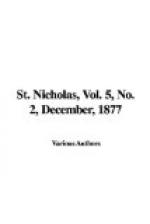LITTLE MAY
Once upon a time there lived a little girl whose father and mother were very rich, so the little girl had lovely dresses, but she had a very bad temper and was very proud so nobody loved her. One day this little girl I might as well tell you her name it was May was sitting in her mothers lap Mama said she what makes everybody act so to me? Dear said her mother it is because you are so proud and get angry so easily then said May if I should try to be good would they like me Yes said her mother so after that May was a better child and every body liked her even her mother loved her better than before and so did her father and after that the little girl was no more saying Oh dear nobody loves me but lived happy and contented.
ELISE L. LATHROP.
* * * * *
Geneva, N.Y.
DEAR ST. NICHOLAS: I notice in a chapter of “His Own Master” for September a mistake which I can correct. In describing the Cincinnati suspension bridge, it says that trains go across on it. This is a mistake, as that bridge is only used for carriages, horse-cars and pedestrians, the steam-cars going across on another bridge above. There is now building a new railroad bridge below for the new Southern Railroad.—Yours respectfully,
W.S.N.
* * * * *
San Leandro, Cal., Sept. 3, 1877.
DEAR ST. NICHOLAS: I tried the Little Schoolma’am’s way of pressing flowers, and I think it is ever so nice. I pressed a wall-flower; it retained all its brightness and looked just like a fresh flower. Last spring we discovered a humming-bird’s nest in one of the trees in our orchard. It was very pretty, being no larger than half of a hen’s egg. The first time I saw it the little mother was on it; she sat as still as a stone, and looked as if she would not budge an inch for me or anybody else. I am always very glad when the ST. NICHOLAS comes.—Your affectionate little reader,
SUSIE R. IRWIN.
* * * * *
Princeton, N.J.
DEAR ST. NICHOLAS: I would like to tell you of the interesting expedition I made last August to the college observatory here for the purpose of seeing the three planets, Jupiter, Mars and Saturn. Through the telescope we were shown Mars burning with a ruddy glow, and having on the rim of one side a bright white spot, which the professor told us was the ice piled up around the north pole; Saturn with its rings, seen with wonderful clearness, and shining pale and far off in comparison with Mars; Jupiter with its two dark bands around the center, and three of its satellites plainly visible; and, last, the moon with its curiously indented surface and ragged edge. The telescope was small, so we could not, of course, see the newly discovered satellites of Mars, the professor saying that there were only two instruments in this country that would show them. Hoping that you may have as good an opportunity to see these splendid heavenly bodies as I have had, I remain, your friend,
B.H.S.




